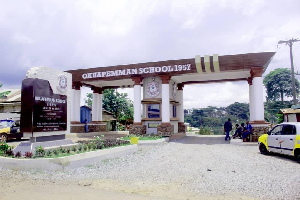- Home - News
- TWI News | TV
- Polls
- Year In Review
- News Archive
- Crime & Punishment
- Politics
- Regional
- Editorial
- Health
- Ghanaians Abroad
- Tabloid
- Africa
- Religion
- Election 2020
- Coronavirus
- News Videos | TV
- Photo Archives
- News Headlines
- Press Release
General News of Monday, 15 May 2000
Source: GNA
Supreme and Appeal Court Judges undergo computer appreciation course
Accra, May 15, GNA - The World Bank and the Government of Ghana are sponsoring a three-week computer appreciation and literacy course for 50 Supreme and Appeal Court Judges to enable them to adjudicate cases speedily to remove the backlog of cases in the courts.
The course is part of a two-year pilot project with the aim of mechanising and reforming the legal sector to build public confidence in the judicial system and to avoid the incidence of people taking the law into their own hands and dishing out instant justice.
About 2.5 million dollars has been provided by the World Bank for the commencement of the project which is expected to train about 100 judges and bailiffs in Accra, Tema and Kumasi.
At the end of the course, participants would have the ability to capture, analyse, communicate and store high quality information relevant to cases brought before the courts and tribunals for their speedy adjudication.
Mr George A. Aryeetey, Acting Judicial Secretary, who opened the course, said the continuing judicial education for judges, chairman and panel members is part of the reform programme to mechanise and computerise court proceedings.
This is to avoid long and manual recording of proceeding, which has been a major cause of delay in trial of cases. "An effective judiciary is the one that provides fair, equitable, fast and just dispute settlement conducted efficiently and without delay.''
Mr Aryeetey said there is the need to amend some of the strategies, methods and procedures of the Judiciary to bring it to a standard that would make it more effective in fulfilling the ideals of change and development for the 21st century.
Mr Ayeetey said for over a century now, judges have been recording proceedings in courts laboriously in longhand. "This does not only cause delay in trials and hearing of cases, but also affects the health of our judges." He said a recent study conducted into the judicial service revealed that the courts are still using obsolete equipment, lack adequate funding, have heavy load of cases and judges have low moral due to poor conditions of service.
Mr Ayeetey said too much lip service has been paid to the war against delay of cases pending before the courts and commended the government and the World Bank for their initiative. He appealed to participants to take the lessons seriously in order to become computer literate and be able to capture, store, access and retrieve information on the computer for efficient service delivery.
Mr Frank Avorkliya, Project Manager of the Legal Sector Reform and Representative of the World Bank, said the course is a pilot project which would last for three months. Based on the results, the training would be expanded to cover all personnel of the judicial service in the country by 2002. He said 40 computers have so far been provided for the participants and urged them to take keen interest in the course to enable them to upgrade their knowledge and enhance delivery by the judiciary.
Justice Charles Hayford-Benjamin, Director of the Continuous Judicial Education Programme, who chaired the function, said the judiciary has taken some time to get to this stage and advised participants to take the course seriously in order not to put their efforts to waste.










